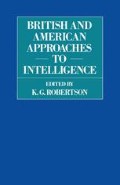Abstract
Among the worst fates that can befall a nation, and its intelligence services, is to be the victim of a surprise attack. The British response to the European crisis of the 1930s suggests an intriguing paradox. Long-range intelligence predictions were made early in the decade concerning an Anglo-German conflict. Policy in the last years of the 1930s was directed at confronting (or avoiding) the prospect of war with the Third Reich. Defence preparations and strategic planning for much of the 1930s were designed to meet a German threat. When war finally came in September 1939, and the air raid sirens sounded over London, Britain did not suffer an intelligence trauma comparable with the shock dealt out to the Russians by Operation Barbarossa or to the Americans by Pearl Harbour. Yet Britain embarked on World War II manifestly unprepared for a major conflict with Germany.1 The paradox is thus to be found in the condition of a state apparently unsurprised by war, but also unready for it. This essay will attempt to explore the concept of strategic surprise and, through an examination of the origins of intelligence prediction about Nazi Germany, seek to resolve this paradox.
Access this chapter
Tax calculation will be finalised at checkout
Purchases are for personal use only
Preview
Unable to display preview. Download preview PDF.
Notes
The most comprehensive treatment of British rearmament in the 1930s is N. H. Gibbs, Grand Strategy, Vol. 1: Rearmament Policy (London: HMSO, 1976).
David French, ‘Spy Fever in Britain 1900–1915’, The Historical Journal, vol. 21, no. 2 (1978) 355–70;
Christopher Andrew, ‘The Mobilization of British Intelligence for the Two World Wars’, in N. F. Dreisziger (ed.), Mobilization for Total War (Waterloo, Ont.: Wilfird Laurier University Press, 1981) pp. 89–110.
Nicholas P. Hiley, ‘The Failure of British Espionage against Germany, 1907–1914’, The Historical Journal, vol. 26, no. 4 (1983) pp. 867–89.
Uri Bialer, The Shadow of the Bomber: the Fear of Air Attack and British Politics, 1932–1939 (London: Royal Historical Society, 1980).
Some details of SIS work in the 1930s can be found in F. H. Hinsley, British Intelligence in the Second World War, vol. 1 (London: HMSO, 1979) ch. 2 and appendix 2; an account of Winterbotham’s career, from the time of his joining the SIS in 1930, is contained in
Frederick W. Winterbotham, The Nazi Connection (London: Weidenfeld & Nicolson, 1978).
Wesley K. Wark, ‘British Intelligence on the German Air Force and Aircraft Industry, 1933–1939’, The Historical Journal, vol. 25, no. 3 (1982) pp. 627–48.
Sir Robert Bruce Lockhart, Comes the Reckoning (London: Putnam, 1947) p. 26.
Richard K. Betts, ‘Analysis, War and Decision: Why Intelligence Failures are Inevitable’, World Politics, vol. 31, no. 1 (1978) pp. 61–89;
AAA Betts, Surprise Attack: Lessons for Defense Planning (Washington, D.C.: The Brookings Institute, 1982);
Michael Handel, The Diplomacy of Surprise: Hitler, Nixon, Sadat. Harvard Studies in International Affairs, no. 44 (Harvard University: Centre for International Affairs, 1981);
Klaus Knorr, ‘Failures in National Intelligence Estimates: the Case of the Cuban Missiles’, World Politics, vol. 16 (April 1964) pp. 455–67;
Avi Schlaim, ‘Failures in National Intelligence Estimates: the Case of the Yom Kippur War’, World Politics, vol. 28 (April 1976) pp. 348–80;
Benno Wasserman, ‘The Failure of Intelligence Prediction’, Political Studies, vol. 8, no. 2 (1960) pp. 156–69;
H. A. de Weerd, ‘Strategic Surprise in the Korean War’, Orbis, vol. 6, no. 3 (1962) pp. 435–52;
Barton Whaley, Codeword Barbarossa (Cambridge, Mass.: MIT Press, 1973);
Roberta Wohlstetter, Pearl Harbour: Warning and Decision (Stanford University Press, 1962);
M. Handel, ‘Avoiding Political and Technological Surprise in the 1980’s’ in R. Godson (ed.), Analysis and Estimates, vol. 2 (Washington D.C., National Strategy Information Center and Transaction Books, 1980).
For an extended treatment of British intelligence in the 1930s, see Wesley K. Wark, The Ultimate Enemy: British Intelligence and Nazi Germany 1933–1939 (Ithaca, N.Y.: Cornell University Press, 1985);
also useful are David Dilks, ‘Appeasement and Intelligence’, in AAA Dilks (ed.) Retreat from Power: Studies in Britain’s Foreign Policy of the Twentieth Century (London: Macmillan, 1981) pp. 139–69; Hinsley, chs 1 and 2;
and D. C. Watt, ‘British Intelligence and the Coming of the Second World War in Europe’, in Ernest May, (ed.), Knowing One’s Enemies: Intelligence Assessment before the Two World Wars (Princeton University Press, 1984) pp. 231–70.
See the discussion in Edward Bennett, German Rearmament and the West 1932–1933 (Princeton University Press, 1979) ch. II; Military Attaché, Berlin, despatch, 3 July 1934, C4583/20/18, FO 371/17695.
On Hankey, see the biography by Stephen Roskill, Hankey, Man of Secrets, 3 vols (London: Collins, 1970–74); Hankey testimony to Cabinet Disarmament Committee, DC(M) 41st mtg., 3 May 1934, CAB 16/110.
On the concept of the devil’s advocate, see Robert Jervis, Perception and Misperception in International Politics (Princeton University Press, 1976) p. 417.
Richard Overy, ‘Hitler and Air Strategy’, Journal of Contemporary History, vol. 15, no. 3 (1980) p. 409.
AAA Wohlstetter, ‘The Pleasures of Self-Deception’, The Washington Quarterly, vol. 2, no. 4 (1979) pp. 56–7.
Editor information
Editors and Affiliations
Copyright information
© 1987 Royal United Services Institute
About this chapter
Cite this chapter
Wark, W. (1987). Intelligence Predictions and Strategic Surprise: Reflections on the British Experience in the 1930s. In: Robertson, K.G. (eds) British and American Approaches to Intelligence. RUSI Defence Studies. Palgrave Macmillan, London. https://doi.org/10.1007/978-1-349-08418-0_4
Download citation
DOI: https://doi.org/10.1007/978-1-349-08418-0_4
Publisher Name: Palgrave Macmillan, London
Print ISBN: 978-1-349-08420-3
Online ISBN: 978-1-349-08418-0
eBook Packages: Palgrave Political & Intern. Studies CollectionPolitical Science and International Studies (R0)

